Lt-Gov helps collect ‘nurdles’ and more at Wellington beach clean-up
Administrator | Jun 24, 2019 | Comments 0
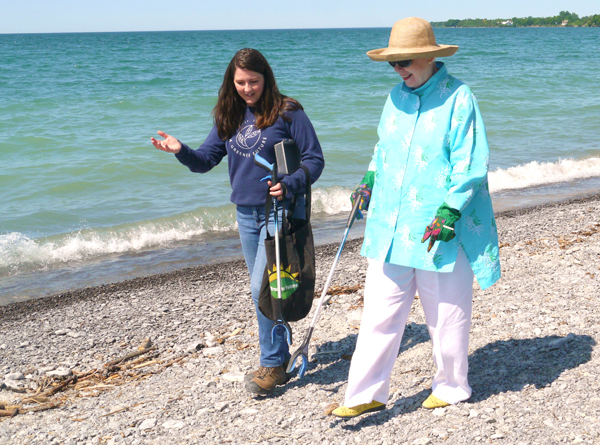
Ontario Lieutenant Governor Elizabeth Dowdeswell walked and helped clean up Wellington Beach Sunday with Rochelle Byrne, left, A Greener Future founder.
Story and photos by Sharon Harrison
Elizabeth Dowdeswell, Ontario’s Lieutenant Governor, joined the environmental group ‘A Greener Future’ and some dedicated volunteers Sunday morning at Wellington beach.
Their mission was to help clean-up the beach, and also to draw attention to garbage washing up on Lake Ontario shores.
Dowdeswell, with Prince Edward County mayor Steve Ferguson, walked the length of the beach and with gloved hands and litter pickers, they collected an assortment of trash in cloth bags.
Rochelle Byrne, the executive director and founder of Oshawa’s A Greener Future, runs a program each year called Love your Lake, where they undertake 100 clean-ups along the shores of Lake Ontario. The stop in Wellington comes almost at the end of this year’s event, which began in Niagara-on-the-Lake and concludes in about a week in Kingston.
“The high water levels have made things challenging this year because some of the beaches we generally go to are closed,” said Byrne. “Some of them have water so high that there is no beach left, and the other problem is that it brings a lot of debris. Some of it is natural debris like driftwood, but a lot of it is plastic pieces, bottles, caps, that kind of thing.”
“There hasn’t been a beach we have been to that we didn’t find garbage. It’s everywhere, and it’s big and small,” she said.
Dowdeswell noted the importance of the visit and how it is that the group has been so disciplined in going from Niagara-on-the-Lake to Kingston to clean up the shores and keep track of what they are finding.
“It’s one of the things that shows that every individual can make a difference. Even talking half an hour of your time and going for a nice walk and cleaning up some of the garbage we find,” said Dowdeswell.
Byrne brought a jam jar filled with small, round hard pieces of coloured plastic to demonstrate the danger of ‘nurdles’ in the environment. She explained the plastic pellets are used in manufacturing new plastic products. Byrne brought a few small sifters to show how scooping up a small amount of sand can reveal the nurdles.
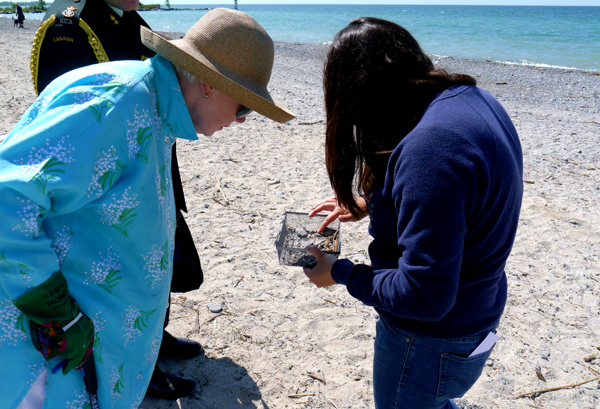
Rochelle Byrne, A Greener Future founder shows Lt.-Gov Elizabeth Dowdeswell, how sifting sand can reveal plastic pellets called ‘nurdles’
“A factory will order nurdles and melt them down and pour that into their moulds,” she said, adding there have been a few accidents in the Great Lakes where cargo ships dropped shipping containers into the lakes, and now the group find them on almost every sandy beach they go to.
“They are dangerous because wildlife mistakes them for food and they are hard to clean-up because they are so small. Most people don’t really know about them because they don’t even really see them when they are at the beach, so that makes it an even bigger problem because there is no awareness.”
She noted the jar’s contents, containing 3,000 nurdles, were picked-up in a 10 by 10 square foot area at Sandbanks Provincial Park.
“You can just imagine how many millions of them there are on the shores of Lake Ontario. We find them a lot in Prince Edward County, as well as in Hamilton and Burlington because there’s a lot of shipping that goes on in that area.”
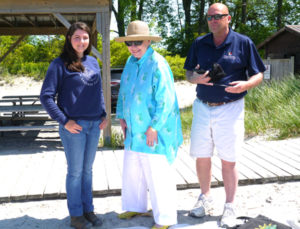
Rochelle Byrne, A Greener Future founder, Lt-Gov Elizabeth Dowdeswell and PEC mayor Steve Ferguson.
Mayor Ferguson was pleased to attend the unofficial visit by Dowdeswell, and noted how interesting it was to hear more about the organization and the Love your Lake initiative.
“We have 360 degrees of lake we all love, so learning more about what Rochelle [Byrne] and her organization are finding washing up on the shores underscores some of the activities and initiatives we’ve recently seen occur in the County, such as the formation of Plastic Free PEC and the pending formation of the environmental advisory committee,” said Ferguson.
He noted how interesting it was to learn firsthand the effects this has on the County’s shoreline.
“What we have learned so far is pretty alarming and some of this is happening very quickly,” he said. “When Plastic Free PEC made the deputation at council, that mindset of the use of single use plastics has become very topical, very quickly. We are starting to see it in the way restaurants are replacing their plastic utensils with bamboo, and the way paper straws are now being made available.”
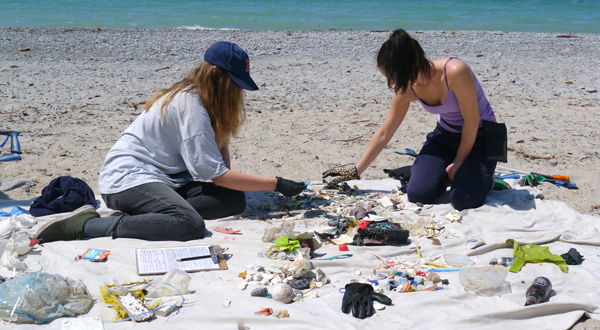
Some of the items of litter recovered from Wellington beach being sorted into categories by volunteers.
Once the garbage from the beach has been collected, it is dumped out in a specific area where a team sorts through it, and collects data on what was found. One of the things A Greener Future is trying to do with the clean-ups is not create more garbage and ensure resources are saved. As much as possible, everything they use is reusable and they limit the amount of plastic they use.
Items collected at Wellington beach Sunday included tiny bits and pieces of rope, tissues, bottle tops, metal, coffee cup lids, plastic caps, cardboard, plastic straws, tin cans, polystyrene, plastic ribbon, cigarette butts, plastic bags, latex gloves, fabric, lighters, combs, rubber, wipes, as well as a large assortment of pieces of plastic ranging in size and colour.
The group has been working in the County for the past couple of days and noticed a lot of shot gun shells and wads. Byrne said there is a lot of hunting that goes on in Kingston which accounts for the higher concentration found in Prince Edward County.
“This comes from duck hunters on Lake Ontario, when they shoot and the shell comes flying out of the gun and goes into the water and then they wash up elsewhere,” said Byrne. “It’s another thing to keep in mind, and it’s not something people would think of when they think of litter. They think of coffee cups on the ground, but this is litter too and it’s coming from a source that is ignored,” Byrne said. “There are a lot of things we are finding on the ground that people won’t expect, but it’s plastic and it’s going to break down and it’s going to contaminate our environment.”
She would like people to be more aware and to share knowledge, because a lot of people see things washed up on the beach and they have no idea what they are she said. “There is stuff washing in every day.”
Byrne started A Greener Future almost five years ago and operates the Love your Lake program annually, where they work with about 500 volunteers. Some of the clean-up events are public and others involve schools, Girl Guides and similar groups.
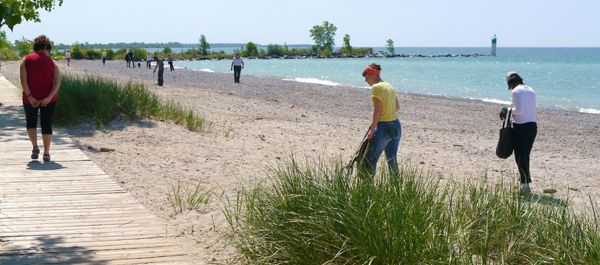
Some of the litter picker volunteers on Wellington beach.
“This year, we have picked up more litter than ever. We are at the 94,000-piece mark and we expect that we will probably pick up 100,000 pieces,” said Byrne. “Last year, we picked up 85,000 pieces throughout the whole project.”
Prince Edward County is one of Byrne’s favourite stops on the clean-up route, noting how peaceful and welcoming it is.
“Sadly, there is still a lot of waste that still ends up washing up on the shores coming from all different locations and a lot of people don’t even realize the implications it has for the health of the ecosystems and wildlife,” she said. “Lake Ontario is our drinking water, so we want to protect it.”
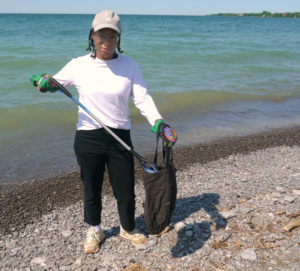
Jewelle Edwards of Carrying Place volunteered to be a little picker.
Jewelle Edwards, of Carrying Place, was one of the volunteers who came out to help pick litter. She had met Rochelle [Byrne] at school and wanted to be here because she is interested in environmental issues.
Byrne says the most importance message is education, because a lot of people don’t realize the problems and need to understand that everyone’s contributing to the waste that’s ending up in the lake.”
Dowdeswell noted how it was the little things on the beach that don’t necessarily get noticed and picked up, especially the plastics that are starting to decompose.
“It’s great thing to do and it doesn’t take much time, and if I can help create some awareness of these little acts, it’s all part of bringing a much cleaner environment for all of us; a safer and healthier one as well,” she said.
“When you see the impact that the single use plastics are having on animals, on mammals, fish, you come to realize they are going to end up in us as well,” she added.
A few days earlier, Mike Harper, Wellington councillor, co-ordinated a separate effort to help remove large quantities of mostly wood covering Wellington beach, the roadway and boardwalk areas after recent flooding, high winds and large waves that washed significant debris ashore.
“It’s our beach, and we are proud of our beach, and we wanted it cleaned up; it’s been a tough two weeks.”
With Canada Day coming up, he also worked with municipal staff and Paul Greer’s excavating company, and put a call out to the Rotary Club for volunteers to help with the clean-up.
“It was a loose plan,” said Harper. “Probably about a dozen people came out with gloves and rakes and we said let’s see what we can do.” They removed everything from the boardwalk and people’s lawns and made piles to be scooped it up with the heavy equipment. Harper said Greer brought five pieces of giant equipment, including a dump truck, where he estimated they took away five dump truck loads of debris over the course of the day.
“I was quite shocked at how little garbage and plastic there was; it was really about the wood, the driftwood and also lots of people lost a bunch of stairs, docks and decks that were broken up, so there was lots of that.”
Harper said the beach was then raked and groomed.
“People once again came through and made short work of it,” said Harper. “It was another demonstration of the community and the Rotary Club.”
Harper will return to the beach next Tuesday with some Rotary members to do one final sweep, to ensure everything looks good in anticipation of Canada Day.
Filed Under: Featured Articles
About the Author:


































